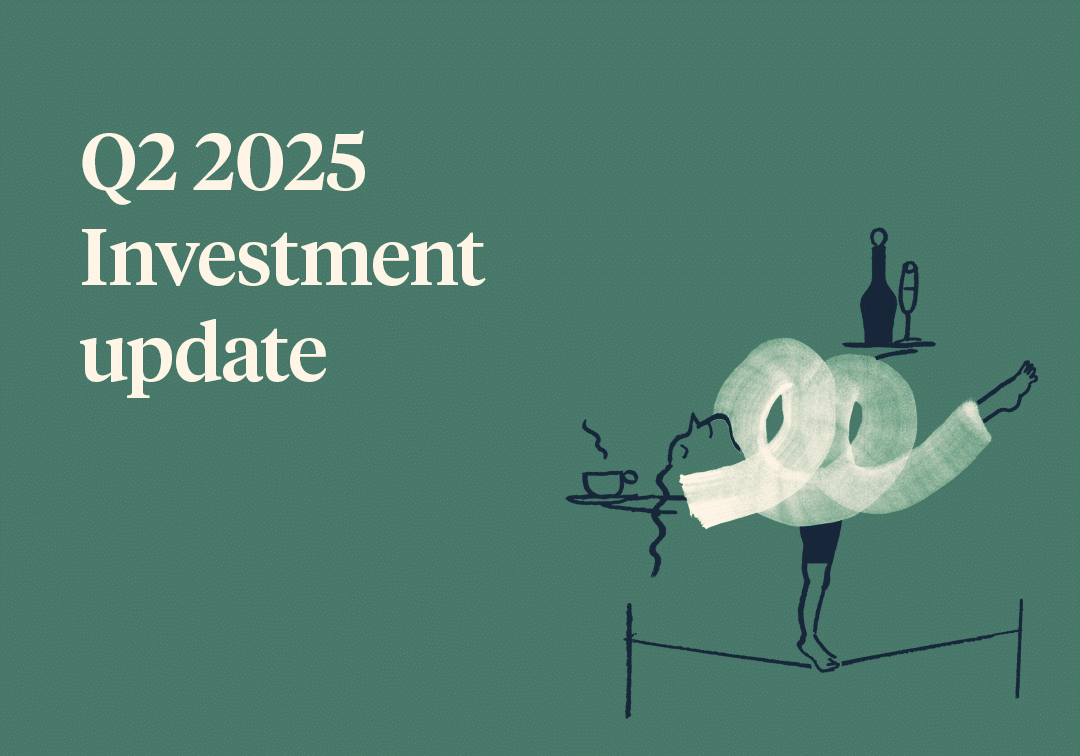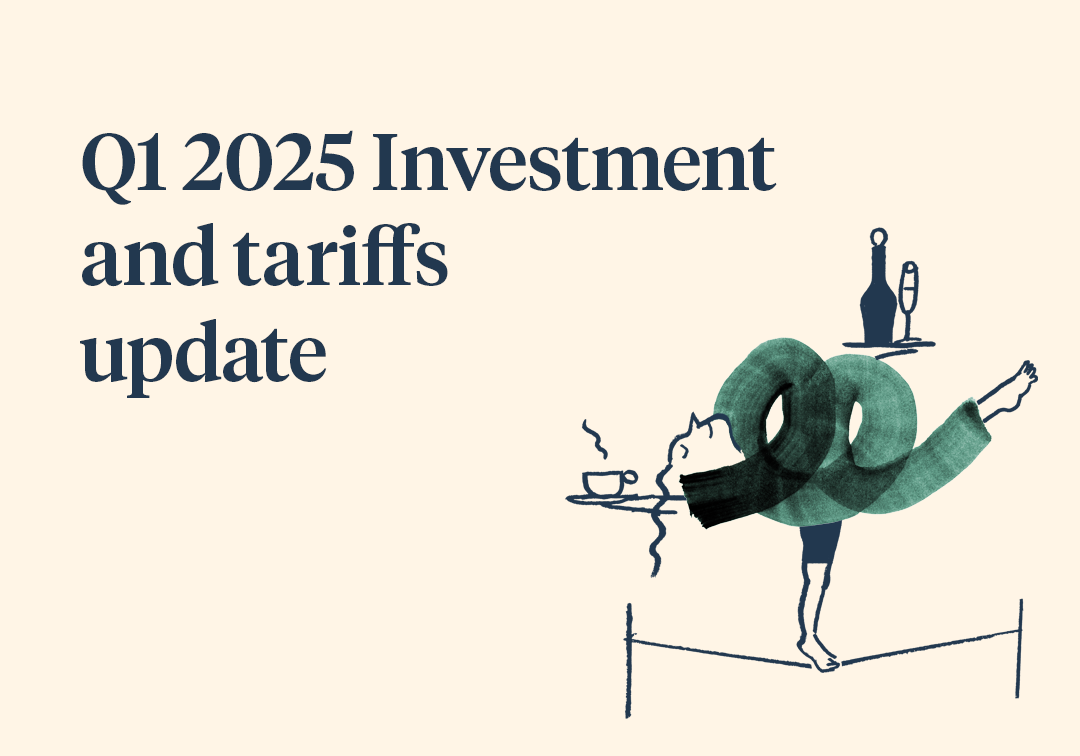Transcript
Michael Stimpson:
Hello, and welcome to our Q2 investment update. I’m Michael Stimpson, and we’re doing it a little bit differently this quarter. I’m going to be taking the Jordan Gillies interviewer role, and we have upgraded the member of the investment team who’s going to be answering questions. We’ve got Charlie Ambler, who is our Co-Chief Investment Officer joining us.
Hi, Charlie, how are you doing?
Charles Ambler:
Hi, Mike. Very well, thank you.
Michael Stimpson:
It’s been an interesting quarter and just an interesting period. I think last time we spoke to clients, we had a Conservative government, there’d been no presidential assassination attempts, and markets were in a slightly different place as well. Do you want to just start by talking us through what’s happened in Q2?
Charles Ambler:
Yeah, of course. Well, a lot of the political events happened at the end of or the start of Q3, month-to-date. Q2 itself was generally quite a positive one for risk assets. There was a lot of noise around the projected interest rate environment in the US at the start of April. By the end of April and towards May and June, falling inflation, robust global economic growth, and central banks now beginning to cut rates all sort of fed through very positively for risk assets.
We saw the bond markets probably being the worst-performing places. That was because they started having to reprice what looks now like there’ll just be one Fed cut, whereas I think if we cast our mind back to January this year it was looking more like three or four.
In equities, the market leadership remained very narrow. The Magnificent Seven continue to be the strong performers and we’ve seen across the spectrum this continuation of trend that started back in 2023 and all the way through to the first half of 2024 continuing-
Michael Stimpson:
Sorry, can you just explain to me the Magnificent Seven?
Charles Ambler:
Yeah, of course. These are the tech mega-cap names in the United States. They are Amazon, Google, Meta, Tesla, Nvidia, Microsoft, and Apple. These guys are well poised to make significant gains in the market share as the AI comes through. They’re also huge multinational companies that have the ability to shrug off interest rate hikes due to having a much, much longer-term debt profile than maybe some of their small-cap names.
So overall, they’ve performed incredibly well throughout the rate hiking cycle and now more into the AI boom that we’ve seen over the last twelve months.
Michael Stimpson:
Great. And so, what has that meant for client portfolios? How have our clients done over the quarter?
Charles Ambler:
Overall, the quarter’s been very positive. You’d see client portfolios depending on risk band up from 1 to 3%. Equity markets are also up in a similar vein. The reason we’ve probably lagged is positioning we’ve taken over the last three, four, five, six months has been to continue trimming in the face of some very high valuations across these mega-cap names. As market leadership has narrowed, it’s become something of a concern for us and there’s a lot being priced in, a lot of perfection in these companies being priced in and for some quite long periods of time.
Michael Stimpson:
Okay, so we’ve been taking some money off the table in some of those companies that have done so well that perhaps now are looking a little bit expensive. What else has been going on in portfolios?
Charles Ambler:
The broader changes we’ve been making are in fixed income. We’ve relocated a fair amount of our government debt over the quarter. We are looking more broadly diversified away from the US, there’s a number of reasons for that, and the main beneficiary in portfolios has been the UK debt market or gilts.
The key changes we’ve seen are firstly the outlook in the US remains very robust as the Fed has rowed back on its rhetoric of making rate cuts. A lot of the reasons for that, a lot of the data-led reasons for that have been because growth remains strong, unemployment remains low, although taking up the margin.
And in the UK, we are seeing a very different picture. The UK market was strong last quarter, part of that was probably due to an uptick in M&A. There’s a flurry of bids in a number of smaller names that helped buoy the market, but it’s definitely far from a broad rally that we’re seeing off the back of, say, stronger growth or low unemployment. We believe that this gives the UK, Bank of England, a much wider scope to cut, especially if it was in the face of any continued economic decline, especially with inflation now hitting 2% areas that we would expect to see as the target for those.
Michael Stimpson:
Okay. Overall, 2024 so far, it’s broadly been pretty good for clients. You’ve talked a bit about lots of that good news has come from a narrow list of names. We’ve been taking a bit of profit in those names. We talked at the very beginning about the political news that we’ve had over the last few weeks. What does that mean we are looking forward to over the next six months as we look to the second half of 2024, how are we feeling about the outlook?
Charles Ambler:
Yeah, I mean, the outlook is, I mean, it’s finely poised, but there are definite reasons to be positive. There remains a lot of uncertainty around a number of cuts and the growth rate that we’ll be seeing over the next six months. The big, big beneficiary of any rate cuts at this point will be any of those companies that have struggled with four or five percent interest rates. What we’d expect is if there were significant cuts, one, two, three, four cuts over the coming 6 to 12 months, broadening out of this equity rally that’s been quite concentrated in the Magnificent Seven names.
The problem with that is whether the Fed will be cutting against the fundamental backdrop of economic strength, or one where the fundamentals are deteriorating and we’re seeing unemployment ticking up and a slightly harder landing scenario, if you will. Rate cuts in the current environment would certainly be positive. And we’ve been positioning portfolios just at the margin to be picking up a bit more of that broadening out rally, whether that’s in US smaller companies, more global areas like emerging markets where rate cuts would mean a softer dollar, which would be a broad beneficiary for emerging markets. Cyclical stocks would also benefit.
There is still a lot of uncertainty around whether the Fed feels that the data is significantly low enough for them to be cutting because one of the things that they’re very, very conscious of is a secondary spike in inflation as we saw back in the ‘70s.
Michael Stimpson:
Okay. So, reasons to be positive, we’ve had a good start to the year. We’re hoping to see the narrow leadership broaden out and in fact, we are positioned for that, although it’s far from guaranteed and we need to be risk-aware at the edges, because if this narrow leadership continues it’s not sustainable indefinitely. Is that a fair summary?
Charles Ambler:
Yeah, absolutely. And obviously with, as you mentioned at the start of this, there’s a lot of political uncertainty going on. The most recent events that we’ve seen have felt like it’s cemented the likelihood of a potential second term for Trump. A lot of his policies look very inflationary and anti-growth, high tariffs, and a lot of protectionisms.
So, we do remain cognizant that there are some significant tail risks around, but generally, the backdrop is very positive. The US consumer remains quite strong. I would be wary of expecting too much anti-growth from Trump in a president who spent much of his first term pointing to the S&P 500 as a metric for his presidential success. So, it’d be quite a U-turn in his second term to be going out and removing a lot of the stuff that’s helped companies grow over the last few decades.
Michael Stimpson:
Perfect. Okay. Well, Charlie, thank you very much. That’s very clear. If you have any further questions, please contact your advisor at Saltus, but from the investment team, reasons to be optimistic and hope for more positive returns in the second half of the year. Thanks very much.
Charles Ambler:
Cheers.


